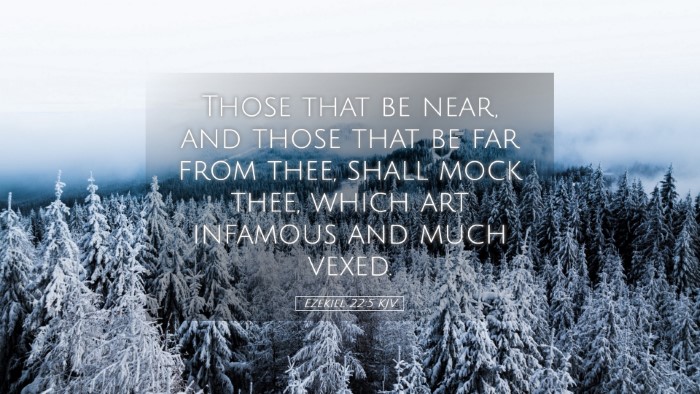Ezekiel 22:5 Commentaries Summary
Verse Text: "Those who are near and those who are far away will come to you; you will be mocked and defiled, and your name will be associated with dishonor." (Ezekiel 22:5, NIV)
Contextual Overview
The book of Ezekiel is a prophetic text that deals heavily with themes of judgment and restoration. Ezekiel, a priest and prophet during the Babylonian exile, communicates God's messages to Israel, emphasizing the consequences of their rebellion and disobedience. Ezekiel 22 serves as a somber indictment of Jerusalem, highlighting the moral decay of the city and its people.
Insights from Matthew Henry
Matthew Henry points out that this verse encapsulates the severe critique of the people of Jerusalem. Their guilt is not only before God but also before the nations. Henry emphasizes that the metaphorical closeness and distance of people with respect to Jerusalem signify the broad acknowledgment of its shame and sinfulness. He underscores the idea that both the "near" (the Israelites) and the "far" (foreign nations) observe Jerusalem's sins, leading to their mockery.
- Moral Decay: Henry notes that the moral state of Jerusalem is cause for concern, as their actions lead to disrepute among surrounding nations.
- Divine Judgment: The verse implies divine judgment not just for the immediate local community but as a witness to the wider world.
- National Shame: The association of God's people with dishonor reflects a stark fall from their intended role as a holy nation.
Insights from Albert Barnes
Albert Barnes presents the notion that Ezekiel 22:5 serves as a prophetic warning of the doom that awaits a sinful city. He interprets the "near" and "far" as representative of both immediate neighbors and distant onlookers who recognize the transgressions of Jerusalem. Barnes highlights that the consequences of sin extend beyond national boundaries, impacting the reputation of God’s people across the world.
- Deserved Mockery: Barnes asserts that the scorn directed at Jerusalem is deserved because of its blatant rebellion against God.
- Global Impact: The text serves as a reminder that the behavior of God's people is scrutinized by others, shaping their understanding of God.
- Reputation of God: The dishonor caused by Israel's sins reflects poorly on God's holiness and faithfulness, raising questions about His character among the nations.
Insights from Adam Clarke
Adam Clarke offers a thorough theological analysis of this passage, reflecting on the weight of the Lord's pronouncements through His prophet. Clarke identifies the significance of the phrase "mocked and defiled," signifying the depth of disgrace that comes from sin. He elaborates that Jerusalem's transgressions result not just in personal failings but in communal and spiritual ruin.
- Spiritual Defilement: Clarke emphasizes that spiritual purity has been sacrificed at the altar of sin, which, in turn, leads to mockery.
- Accountability: He notes the high calling and rapid descent of Jerusalem into dishonor. This serves as a lesson for contemporary believers about accountability.
- Hope for Restoration: Even in judgment, Clarke indicates that there exists the hope of future restoration, a recurring theme in prophetic literature, urging repentance and renewal.
Theological Implications
The passage holds substantial theological implications for understanding the nature of sin and its effects on both individual and communal levels. The concept of being mocked by nations speaks to the testimony of God’s people, where their failure to represent His holiness leads to reproach. This creates a sobering reflection for Christians today in examining how their actions might represent or misrepresent God to the world.
- The Importance of Holiness: Believers are called to maintain a lifestyle that reflects God’s character.
- Corporate Responsibility: The sins of a few can lead to the disgrace of many, emphasizing the necessity of collective repentance.
- Witness to the World: The church’s witness is critical; how they are seen influences the broader understanding of God’s nature.
Conclusion
Ezekiel 22:5 serves as a poignant reminder of the consequences of sin not only on an individual level but also on a corporate scale. Through the insights of Matthew Henry, Albert Barnes, and Adam Clarke, it becomes clear that the warnings issued in Scripture are not solely for the ancient audience but resonate today. The call for holiness, accountability, and rightful representation of God to the world is as pertinent now as it was in Ezekiel's time.


